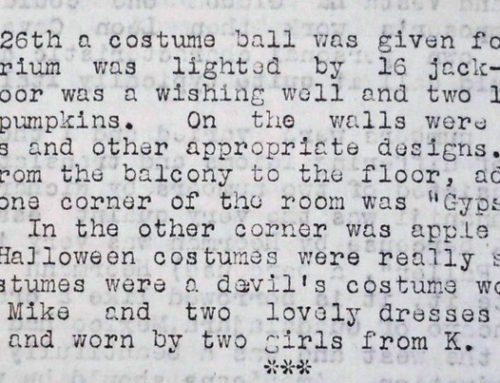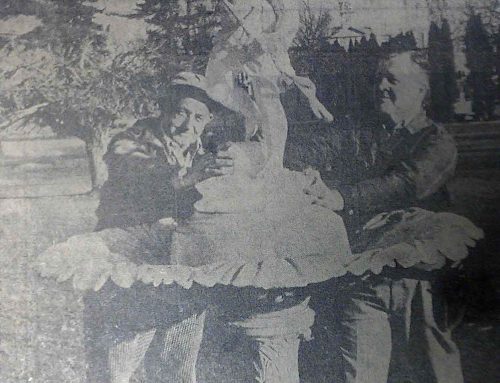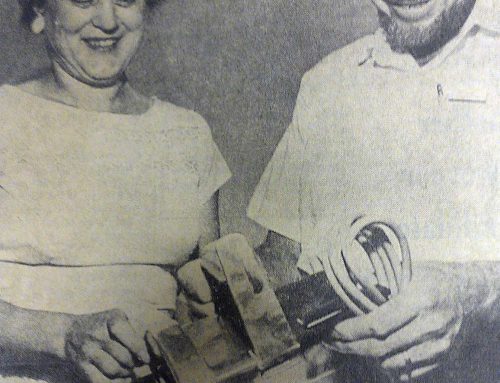The following is a transcription of an article that appeared in the Capital Journal newspaper September 20, 1951 (page 15). Prior to the introduction of specially designated substance abuse recovery and treatment centers, OSH was one of the few places people could go to get help with alcoholism. Even in the earliest records, alcoholism is frequently mentioned as reason for admitting people to the hospital. A 1916-1917 report of “causes of insanity” of people brought to the Oregon State Hospital lists alcoholism as 6th in known causes. This article gives an interesting perspective into treatment practices during the 1950s.
Cure by Hangover? State Hospital Pioneers New Cure for Alcoholics
By Paul W. Harvey, Jr. (Associated Press Special Correspondent)
If you’re an alcoholic and want to get cured, just go to the Oregon state hospital and take the antabuse treatment.
If you keep taking antabuse the rest of your life, you’ll never take another drink. That’s because antabase combines with alcohol to form a poison in the blood stream.
Taking a drink after antabase makes you think you’re going to die. The blood pressure rises, quickly, then falls so low it might cause severe shock. The eye balls pop way out. Then you get violently sick at your stomach.
Antabuse, a newly-discovered chemical, is only one of the many treatments the state hospital uses to try to cure alcoholics. Actually, it is used on only about three per cent of the hospital’s alcoholism victims.
Since antabuse is dangerous unless given under a doctor’s supervision, it can be obtained only from a few selected doctors.
The state hospital is one of the very few in the country that treats alcoholics.
Dr. Dean Brooks, assistant to the hospital superintendent, has charge of treating the ever-increasing number of alcoholics. He doesn’t make any big claims, asserting the treatment is helpful in only 30 per cent of the cases.
Half of the alcoholics come in voluntarily for 30 days. Dr. Brooks said the period should be lengthened to 90 days to do a good job.
He emphasizes that no alcoholic can be cured unless he really wants to be cured. Some come to the hospital to get restored to good physical shape so they can get strong enough to start drinking again.
Dr. Brooks says an alcoholic is a person “who can’t adequately face life unless he drinks, and who can’t face life when he does drink. The poor guy’s caught in the middle. No alcoholic quits because he wants to. He quits because he has to.”
He said most alcoholics come from broken homes. He thinks they are people who haven’t grown up emotionally, so they take to drinking when the hard knocks come.
“We make our approach on a physical and an emotional basis. We try to make them understand themselves,” Dr. Brooks said.
The men alcoholics outnumber the lady alcoholics about 7 to 1. The ladies are harder to treat because they are more complex emotionally.
The typical alcoholic enters the hospital a physical wreck. He’s probably been drinking a quart of whiskey a day.
He is taken off liquor immediately. He gets whirlpool baths to relax him. Drugs, including insulin and sedatives, are used. He gets lots of good food and exercise.
As soon as he is taken off the bottle, the alcoholic might have delirium tremens. He sees pink animals, snakes wearing silk hats or bedbugs nine feet tall.
But after a week, he’ll be in pretty good physical condition. Then if he wants it and can stand it, he gets antabuse. Then he gets a drink of any kind of liquor he wants. The violent reaction from the drink demonstrates what will happen if he stays on antabuse and then takes a drink.
The Salem branch of Alcoholics Anonymous stays in close touch with the alcoholics in the hospital, boosting their morale. Dr. Brooks gives the A.A. a great amount of credit for the curing of alcoholism.
Then, when the alcoholic is discharged, he can have the constant help of A.A.
The hospital has 3,000 patients, and 19 per cent of all new admissions are alcoholics.
There are many repeaters. I met one physical wreck who had just come in for the sixth time.
Dr. Brooks says most alcoholics blame somebody else for their trouble. So the psychiarists
Much of the treatment is experimental, because psychiatrists have a lot to learn about alcoholism. But they are making progress.



